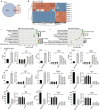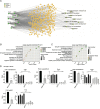Genome-wide analysis revealed the dysregulation of RNA binding protein-correlated alternative splicing events in myocardial ischemia reperfusion injury
- PMID: 37858115
- PMCID: PMC10585833
- DOI: 10.1186/s12920-023-01706-5
Genome-wide analysis revealed the dysregulation of RNA binding protein-correlated alternative splicing events in myocardial ischemia reperfusion injury
Abstract
Background: Myocardial ischemia reperfusion injury (MIRI), the tissue damage which is caused by the returning of blood supply to tissue after a period of ischemia, greatly reduces the therapeutic effect of treatment of myocardial infarction. But the underlying functional mechanisms of MIRI are still unclear.
Methods: We constructed mouse models of MIRI, extracted injured and healthy myocardial tissues, and performed transcriptome sequencing experiments (RNA-seq) to systematically investigate the dysregulated transcriptome of MIRI, especially the alternative splicing (AS) regulation and RNA binding proteins (RBPs). Selected RBPs and MIRI-associated AS events were then validated by RT-qPCR experiments.
Results: The differentially expressed gene (DEG) analyses indicated that transcriptome profiles were changed by MIRI and that DEGs' enriched functions were consistent with MIRI's dysregulated pathways. Furthermore, the AS profile was synergistically regulated and showed clear differences between the mouse model and the healthy samples. The exon skipping events significantly increased in MIRI model samples, while the opposite cassette exon events significantly decreased. According to the functional analysis, regulated alternative splicing genes (RASGs) were enriched in protein transport, cell division /cell cycle, RNA splicing, and endocytosis pathways, which were associated with the development of MIRI. Meanwhile, 493 differentially expressed RBPs (DE RBPs) were detected, most of which were correlated with the changed ratios of AS events. In addition, nine DE RBP genes were validated, including Eif5, Pdia6, Tagln2, Vasp, Zfp36l2, Grsf1, Idh2, Ndrg2, and Uqcrc1. These nine DE RBPs were correlated with RASGs enriched in translation process, cell growth and division, and endocytosis pathways, highly consistent with the functions of all RASGs. Finally, we validated the AS ratio changes of five regulated alternative splicing events (RASEs) derived from important regulatory genes, including Mtmr3, Cdc42, Cd47, Fbln2, Vegfa, and Fhl2.
Conclusion: Our study emphasized the critical roles of the dysregulated AS profiles in MIRI development, investigated the potential functions of MIRI-associated RASGs, and identified regulatory RBPs involved in AS regulation. We propose that the identified RASEs and RBPs could serve as important regulators and potential therapeutic targets in MIRI treatment in the future.
Keywords: Alternative splicing; Correlation network; MIRI; RNA binding protein; RNA-seq.
© 2023. BioMed Central Ltd., part of Springer Nature.
Conflict of interest statement
The authors declare no competing interests.
Figures



Similar articles
-
Identification of alternative splicing and RNA-binding proteins involved in myocardial ischemia-reperfusion injury.Genome. 2023 Oct 1;66(10):261-268. doi: 10.1139/gen-2022-0102. Epub 2023 Jul 19. Genome. 2023. PMID: 37466303
-
Involvement of dysregulated RNA binding protein and alternative splicing regulatory networks in diabetic nephropathy from type 2 albuminuric cohorts.BMC Nephrol. 2025 Jul 1;26(1):326. doi: 10.1186/s12882-025-04237-6. BMC Nephrol. 2025. PMID: 40597902 Free PMC article.
-
Genome-wide analysis of RNA-binding proteins co-expression with alternative splicing events in mitral valve prolapse.Front Immunol. 2023 Apr 26;14:1078266. doi: 10.3389/fimmu.2023.1078266. eCollection 2023. Front Immunol. 2023. PMID: 37180137 Free PMC article.
-
N(6)-methyladenosine modification: A vital role of programmed cell death in myocardial ischemia/reperfusion injury.Int J Cardiol. 2022 Nov 15;367:11-19. doi: 10.1016/j.ijcard.2022.08.042. Epub 2022 Aug 21. Int J Cardiol. 2022. PMID: 36002042 Review.
-
The pathological mechanisms and potential therapeutic drugs for myocardial ischemia reperfusion injury.Phytomedicine. 2024 Jul;129:155649. doi: 10.1016/j.phymed.2024.155649. Epub 2024 Apr 16. Phytomedicine. 2024. PMID: 38653154 Review.
Cited by
-
Association of MTMR3 rs12537 at miR-181a Binding Site with Ischemic Stroke in Southern Chinese Han Population.Int J Gen Med. 2025 May 22;18:2659-2672. doi: 10.2147/IJGM.S524033. eCollection 2025. Int J Gen Med. 2025. PMID: 40433045 Free PMC article.
-
Identification of diagnostic genes for myocardial ischemia reperfusion injury associated with metabolic syndrome through the integration of bioinformatics analysis, molecular docking and experimental validation.Front Immunol. 2025 May 29;16:1567572. doi: 10.3389/fimmu.2025.1567572. eCollection 2025. Front Immunol. 2025. PMID: 40510362 Free PMC article.
-
Biological function of RNA-binding proteins in myocardial infarction: a potential emerging therapeutic limelight.Cell Biosci. 2025 May 24;15(1):65. doi: 10.1186/s13578-025-01408-8. Cell Biosci. 2025. PMID: 40413549 Free PMC article. Review.
References
Publication types
MeSH terms
Substances
LinkOut - more resources
Full Text Sources
Research Materials
Miscellaneous

